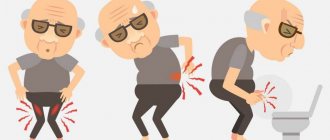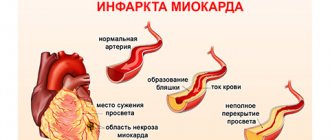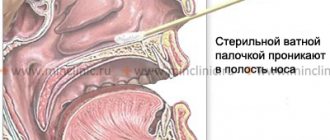General information about male disease
Cystitis in men is an infectious disease. The prevalence of this disease in men is much less than in women. This is explained by the fact that it is more difficult for bacteria that cause the disease to enter the male body. The male urethra is longer, so the infection does not reach the internal organs of men as often as in women.
Cystitis is a disease that affects the genitourinary system, regardless of the person’s gender. The course and symptoms of the disease differ somewhat among representatives of different sexes, although there are common signs. Cystitis in men is a process of inflammation of the urinary system. With this disease, the mucous tissue of the bladder is affected, as a result of which the man experiences discomfort and cannot live a full life.
Manifestations of abnormal bladder activity: painful and frequent urination, the appearance of mucus and blood in the urine, repeated urges to visit the toilet at night. The patient may not immediately see a doctor; this is dangerous because of its consequences. Cystitis can become chronic and lead to other complications. In order not to progress the disease, try to contact experienced specialists at the Global Clinic Center in a timely manner.
Blog
A lot has been said and written about cystitis. But few people talk about the connection between cystitis and gynecological diseases - colpitis, candidiasis, sexually transmitted infections, etc. This article draws connections between these issues.
Cystitis is the most common urological disease among women. To one degree or another, signs of cystitis are observed at least once in a lifetime in more than half of women. For some, cystitis becomes an annoying nuisance, for others it turns life into hell, which, unfortunately, is not uncommon. We can safely say that cystitis is not “lucky”: this disease is at the intersection of two specialties - urology and gynecology. Inflammation of the bladder itself is a urological problem, and the reason that in most cases leads to the development of cystitis - a violation of the vaginal microflora - is a gynecological problem. It turns out that with a competent approach, a woman with cystitis should be treated by two doctors at once - a urologist and a gynecologist. But life shows that most often the problem of cystitis is dealt with by a gynecologist.
WHAT IS CYSTITIS?
Cystitis is an inflammation of the mucous membrane of the bladder. There are toxic, allergic, non-infectious cystitis - all these are rare and we will not talk about them. In the vast majority of cases, cystitis is caused by one or another infection. Most often this is one of the representatives of opportunistic flora - E. coli, staphylococci, streptococci, etc. Often there are cystitis directly associated with sexually transmitted infections, for example: ureaplasma, mycoplasma, chlamydia, gonorrhea. The infection enters the woman's bladder from the urethra. In women, it is short, wide, and it is very easy for bacteria to get through it. Bacteria most often enter the urethra from the vagina. Cystitis is almost always associated with inflammation of the vagina - colpitis, or a disturbance of the vaginal microflora - bacterial vaginosis. Traditionally, exacerbations of cystitis are associated with hypothermia. Yes, indeed, hypothermia causes a decrease in the body's resistance, especially the local immune response, as a result of which the infection actively multiplies and enters the bladder, causing an inflammatory reaction - cystitis. However, practice shows that cystitis is more often associated with particularly violent sexual intercourse. Sometimes exacerbations of cystitis are associated with the menstrual cycle.
“HONEYMOON” CYSTITIS
This beautiful term implies the development of signs of cystitis after defloration, that is, deprivation of virginity. The following happens. Even before a girl begins sexual activity, she may have disturbances in the vaginal microflora. This happens all the time; thrush in girls is so common that it is considered almost the norm. The first sexual intercourse is not always violent, but it is still accompanied by an abundant flow of vaginal microflora into the urethra and bladder. Their walls are not prepared for such an attack, and an inflammatory reaction develops, that is, cystitis. It’s rare that someone gives up sex on their honeymoon, even despite illness. Therefore, cystitis progresses and progresses...
SYMPTOMS OF CYSTITIS
Cystitis is manifested primarily by increased urination. At the same time, the woman constantly has a strong urge to visit the toilet, which does not correspond to the amount of urine released. Often a woman notices pain at the end of urination, sometimes blood appears in the urine. With acute cystitis, the temperature rises and pain appears in the lower abdomen. If the so-called cervical form of cystitis develops, in which the bladder sphincter is involved in the inflammatory process, then episodes of urinary incontinence are observed. Cystitis should not be confused with urethritis - inflammation of the urethra. Urethritis is manifested by unpleasant sensations, pain, burning or stinging when urinating - and nothing more. Cystitis and urethritis often accompany each other, but this is not always the case.
WHAT DO MANY WOMEN DO?
Most often, at the first symptoms of cystitis, on the advice of more “experienced” friends, the girl takes several tablets of the first antibiotic she comes across, the symptoms of the disease subside and they forget about it until the next exacerbation. This can go on for years. Unfortunately, some doctors do no better in this situation. The urologist at the district clinic will do a general urine test, after which he will prescribe some kind of uroseptic. A few days pass, the symptoms of cystitis decrease, and everything is fine. Nobody thinks about why cystitis worsened and how to prevent it. However, exacerbations of cystitis occur again and again. A woman is forced to wrap herself in warm clothes even in the heat, always think about what she can eat and what she cannot, and fear every intimacy with her loved one. This state of affairs can drive you crazy...
CAUSES OF CYSTITIS:
As already noted, in the vast majority of cases, the development of cystitis is associated with an infection in the vagina. Normally, a woman’s vagina is inhabited by microflora. It is based on the so-called lactobacilli, or Dederlein bacilli; there are also a small number of bifidobacteria and some other microorganisms. All these microbes are in ecological balance, their numbers are strictly controlled by each other, and they do not allow any other microorganism to appear in the vagina. Under the influence of various factors, this balance may be disrupted. These factors are varied - from stress and hypothermia to hormonal changes, pregnancy or withdrawal of oral contraceptives. An imbalance occurs when colonies of some microorganisms grow in large quantities and suppress all others. These may be fungi of the genus Candida, and the resulting disease will be called vaginal candidiasis, or simply “thrush”. It could be gardnerella - then the disease will be called gardnerellosis (bacterial vaginosis). It could be some kind of sexually transmitted infection - ureaplasmosis, trichomoniasis, chlamydia. These can be almost any microorganisms that have pathogenic activity. Vaginal dysbiosis is often accompanied by intestinal dysbiosis. Manifestations of bacterial vaginosis And so, a violation of the vaginal microflora has occurred. Classic symptoms for this disease are burning and itching in the genitals, copious mucous discharge, sometimes with an unpleasant odor, dryness and discomfort during sexual intercourse. These symptoms can be expressed to varying degrees, from very strong to subtle. In addition, bacterial vaginosis is a chronic disease and occurs with periods of exacerbations and remissions. If a microflora disorder was previously noted, then exacerbations occur periodically. From bacterial vaginosis there is only one step left to vaginitis, or colpitis - inflammation of the vagina. With this disease, the discharge begins to be purulent in nature, pain and pain appear in the genitals, and sometimes the body temperature rises. In the same way, one step remains to cervicitis - inflammation of the cervix (pain in the lower abdomen, painful sexual intercourse), urethritis - inflammation of the urethra (pain and burning when urinating). Very close to cystitis.
COMPLICATIONS OF CYSTITIS
Over a long period of time, the infection from the bladder enters the kidneys, which can lead to the development of pyelonephritis - inflammation of the kidney tissue. This is manifested by high fever and lower back pain on one side. Rarely, pyelonephritis is bilateral, and this situation is already life-threatening. Pyelonephritis, as a rule, is treated seriously, often in a hospital, with careful diagnosis and massive therapy. But even here, no one is engaged in the full treatment of cystitis and restoration of vaginal microflora. As a result, the disease will recur, and with each new attack of pyelonephritis, kidney function decreases. As a result, a woman may become disabled.
Now let's talk about the worst part. With some individual features of the structure of the bladder wall, the inflammatory process spreads to its entire thickness, affecting not only the mucous membrane, as with ordinary cystitis, but also the submucosal layer and the muscular wall of the bladder. This type of cystitis is called interstitial cystitis. Interstitial cystitis has several distinctive features. Such patients urinate frequently, up to 100-150 times a day. There may be pain in the lower abdomen, painful urination, and increased body temperature. Interstitial cystitis is practically untreatable. Sometimes antibiotics make things a little better, but more often they have no effect or cause the condition to worsen. With a long course of such cystitis, the muscle tissue of the bladder wall degenerates into rough scar tissue, the bladder loses its elasticity and decreases in volume. When the bladder volume reaches 50 ml, the only real treatment is surgery - complete removal of the bladder and its plastic from the area of the colon. Every woman who regularly notices exacerbations of cystitis and does not seriously treat it has a chance of developing interstitial cystitis.
CYSTITIS AND PREGNANCY
If a woman suffers from chronic cystitis, it is very likely that another exacerbation will occur during pregnancy. During pregnancy, the hormonal background of the body changes, the disturbance of the vaginal microflora most often worsens, the body's immunity decreases - all this creates conditions for the exacerbation of cystitis.
CYSTITIS AND SEXUAL INFECTIONS
Sexual infections include gonococcus, chlamydia, trichomonas, mycoplasma, ureaplasma, etc. All these pathogens can enter a woman’s vagina during sexual intercourse. Some time after entry, they cause inflammation of the vagina - colpitis, inflammation of the cervix - cervicitis, inflammation of the urethra - urethritis, which leads to disruption of the vaginal microflora - bacterial vaginosis. It often happens that the symptoms of the disease are so insignificant that the woman does not attach any importance to them, especially since after a few days they sometimes go away without treatment. Meanwhile, inflammation or disruption of the microflora becomes chronic, causing, among other things, a decrease in the body’s local immunity. By multiplying in the vagina, genital infections can themselves cause cystitis, but most often, against the background of a decrease in general and local immunity, nonspecific flora enters the bladder, causing exacerbation of cystitis. Therefore, direct or indirect, there is always a connection between sexually transmitted infections and cystitis. And competent treatment in this case should be carried out simultaneously with sexually transmitted infections and cystitis in one course, and at the same time treating the sexual partner.
CYSTITIS IN MEN
In men, cystitis does not occur often and almost always appears against the background of exacerbation of chronic prostatitis. More often, these symptoms are not too pronounced, and with treatment of inflammation of the prostate gland they go away on their own, without requiring additional measures. In other cases, a course of properly administered treatment for cystitis is usually effective. Only the problem of interstitial cystitis for men is almost the same as for women. In this case, surgical treatment is almost always necessary.
CYSTITIS IN CHILDREN
In children, for a number of reasons, cystitis develops quite often. The incidence of the disease is practically unrelated to either age or gender. In teenage girls, cystitis is more often associated with vaginal dysbiosis; in boys, cystitis often develops with phimosis (narrowing of the foreskin), but most often cystitis develops episodically, against the background of an accidental infection in the bladder. Fundamentally, the treatment of cystitis in children does not differ from the treatment of adults. Competent diagnosis necessarily includes a general analysis and urine culture, DNA tests for major infections, which make it possible to identify the pathogen and determine its properties. Cystitis in children very easily spreads to the kidneys, so it is better not to delay treatment, and cystitis must be taken very seriously.
TREATMENT OF CYSTITIS
For acute cystitis, treatment consists of prescribing special medications and bed rest. It is necessary to consume as much liquid as possible and exclude spicy and salty foods, seasonings, sauces, and canned food. Vegetables and fruits, dairy products are recommended.
When treating chronic cystitis, you should start by identifying the causes that led to inflammation. Treatment of cystitis in this case comes down to restoring urodynamics, eliminating foci of reinfection, and removing urinary stones. Antibacterial treatment is also carried out, but only after special examinations. In order to improve blood supply to the walls of the bladder, UHF, mud applications and inductothermy are prescribed.
The causes of cystitis are always individual, so self-medication and refusing to go to the doctor is very dangerous. The selection of medications for the treatment of cystitis should be carried out only by a doctor. Specialists of the diagnostic and treatment center “Dzhalin” LLC with a high degree of accuracy determine the causes of the development of cystitis and its causative agents, using the wide capabilities of modern diagnostic equipment, which is equipped in the urological office of our medical center. The high qualifications of our doctors allow us to exclude cases of medical error.
Urologist-andrologist Vladimir Safronov
Classification of cystitis
There are several signs that form the basis for the classification of the disease.
By methods of manifestation
According to the methods of manifestation, there are two types of cystitis:
- Spicy
- Chronic
Acute cystitis in men can occur:
- first;
- no more than one case per year;
- with a frequency of 2 or more times every 365 days.
For the occurrence of acute cystitis, there are unfavorable factors in the form of uncontrolled use of certain medications and thermochemical effects on a man. An infection that enters the body of men can also cause certain symptoms characteristic of acute stage cystitis.
The chronic form of the disease can be divided into the following subtypes:
- Latent (symptoms of cystitis in men in this case are smoothed out). The frequency of occurrence of the disease is more than two cases per year, the disease is stable or with rare periods of exacerbations.
- Persistent. The process of inflammation and development of cystitis is diagnosed twice a year or more often.
- Interstitial. This is the most severe form of the disease. Cystitis progresses and can lead to serious complications.
According to the etiology of occurrence
Based on this characteristic, doctors distinguish such forms of cystitis in men as primary and secondary. Primary cystitis is in no way associated with other pathologies of men. This is an independent disease. The secondary form may be the result of problems in the genitourinary system and other organs of the patient. Men with prostate adenoma, diseases of the spinal column, abnormal development of the bladder, or ingestion of foreign fragments should be prepared for this kind of disease.
By localization of inflammation
Cervical, diffuse, trigonitis, focal form of cystitis - this diagnosis is made depending on the location of the source of the disease. Each type of disease is characterized by its own symptoms: with cervical cystitis, urine cannot be retained, the patient often “runs” to the toilet; the diffuse form is characterized by the extensive spread of inflammation; With trigonitis, clots of blood and pus appear in the urine.
Profitable loyalty
There is an objective anatomical reason for the fact that cystitis is predominantly female. After all, in the fair sex, the urethra is much shorter and wider than the male one, so the path upward to the bladder for pathogenic microbes becomes shorter and easier. However, for a disease to occur, the penetration of microbial agents alone is not enough. After all, the protective forces of the bladder mucosa, guarded by beneficial lacto- and bifidobacteria, are usually sufficient to give a worthy rebuff to the infection. But if local immunity is weakened, then it’s a different matter. The protective forces of the mucous membrane can be negatively affected, for example, by hypothermia, injury, stress, excessive alcohol intake, promiscuous sex life, poor intimate hygiene, chronic diseases, etc.
By the way, frequent changes of sexual partners for women (and especially young girls with unsettled hormonal levels and not fully formed intimate microflora) are even more harmful than for men. And we’re not just talking about sexually transmitted diseases. After all, the female intimate flora is forced to adapt to the partner’s flora each time (after all, men’s intimate organs normally contain streptococci and other opportunistic flora). At some point, the adaptation process may be disrupted, and then the female microflora will suffer, and against this background, candidiasis, cystitis, and other troubles may arise. Therefore, it is especially important for girls to remain faithful to their only sexual partners, and it is better for very young ladies not to rush into “adult” life.
Causes of cystitis in men
Cystitis is most often provoked by various infections that penetrate the male body. The bladder, which contains intestinal, Pseudomonas aeruginosa, tuberculosis bacilli, staphylococci, gonococci, begins to malfunction, and inflammation of various etiologies and localization occurs. There are many unfavorable factors for the appearance of cystitis in men:
- weak immune system;
- powerful radiation exposure of men;
- allergy;
- prolonged and severe hypothermia;
- presence of infections;
- injuries in the bladder area.
Frequent stress, excessive passion for work, smoking, alcohol, and a disordered sex life have a detrimental effect on a man. Men who have undergone unprofessional surgical intervention in the area of the urethra and bladder should be warned about possible negative consequences. Trusting the professional doctors from the Global Clinic Center is the first step towards a successful solution to the problem.
Cyston
“Cyston” is another drug against cystitis of plant origin. Cyston is sold in tablets and is available without a prescription. The drug contains: double-carp, madder cordifolia, saxifrage, strawflower and membranous. “Cyston” fights microbes, relieves inflammation and spasms of the urinary tract, has a mild diuretic effect, and removes urinary sand and salts. “Cyston” also has a mild antibacterial effect, although not as pronounced as that of synthetic drugs for cystitis. This is more than compensated for by the minimum of side effects and contraindications. "Cyston" is usually prescribed for preventive purposes or in complex therapy of cystitis (in parallel with antibiotics). "Cyston" can be taken by pregnant and lactating women. The drug must be taken for a long time (about three months), since it has a cumulative effect.
Cyston
Himalaya Friend, India
As part of complex therapy: - urolithiasis;
- crystalluria; - urinary tract infections (cystitis, pyelonephritis); - gout. from 345
4.0 1 review
1079
- Like
- Write a review
Symptoms of male cystitis
The most common symptoms of cystitis in men are:
- Frequent (often with difficulty and pain) urination.
- Change in urine odor.
- Presence of pus and bloody discharge in the urine.
- Burning and itching when urinating.
Specific symptoms may be accompanied by general negative signs: weakness, decreased ability to perform usual work, painful manifestations in the groin, scrotum, bladder, increased body temperature. A man with cystitis becomes nervous, irritable, vulnerable to other diseases - the presence of these symptoms varies from person to person. The intensity of the signs of the disease increases along with the neglect and progression of cystitis.
Furadonin
"Furadonin" is a medicine for cystitis of synthetic origin with an antimicrobial effect. You can buy Furadonin with a doctor's prescription. The drug copes well with most microbes and is prescribed for both acute and chronic cystitis. Anti-cystitis tablets effectively destroy the cell walls of bacteria, which are then excreted from the body in the urine. Symptoms of cystitis disappear on the second or third day of treatment with Furadonin, but the course must be completed in full to avoid relapse. The drug relieves inflammation, inhibits the proliferation of microbes and is completely excreted in the urine, while the maximum concentration of the drug is created precisely in the foci of inflammation - the bladder and kidneys. The only disadvantage of these tablets for cystitis is the suppression of beneficial intestinal microflora, so during treatment you need to adhere to a certain diet and take probiotics.
Furadonin
Diagnostics
The success of treatment largely depends on timely diagnosis. Modern methods of diagnosis are used by medical specialists from the Global Clinic Center. The doctor who conducts the appointment carefully listens to the patient’s complaints, taking an anamnesis of the disease. After this, the patient will be asked to do a urine test. The Nechiporenko method and bacterial culture are effective diagnostic methods.
The speed and smoothness of the process of urine passage through the urethra and other organs of the excretory system can be determined by the uroflowmetry method. The use of an endoscope in cytoscopy makes it possible to examine the bladder from the inside. This method gives an accurate picture of possible organ pathologies.
The male type of cystitis can be diagnosed using an ultrasound of the prostate to identify the amount of residual urine. The use of ultrasound to examine the bladder is difficult due to the overcrowding of this organ. A blood test for general analysis is also prescribed to patients to identify the causes of the disease.
Phytolysin
This is a plant-based drug for cystitis, sold in the form of tablets or paste. You can buy “Fitolysin” without a doctor’s prescription. Contains: extracts of horsetail, wheatgrass rhizome, onion, common parsley, and knotweed. The drug has a complex effect on the urinary system: antispasmodic, anti-inflammatory, diuretic and weak antibacterial. “Fitolysin” is prescribed in the complex therapy of cystitis in its acute and chronic forms (in parallel with antibiotics); it can also be used for prophylactic purposes. The course of treatment with Phytolysin is 14-40 days, the duration is determined by the doctor. The medicine is well tolerated, but the paste has a specific smell and taste, so not all patients choose this form of the drug.
Phytolysin
Polfa, Poland
— infectious and inflammatory diseases of the urinary tract (as part of complex therapy);
— nephrourolithiasis (as part of complex therapy). from 287
1024
- Like
- Write a review
Treatment
Treatment comes down to a whole range of effective measures that must be followed.
Medicines
The main drugs that fight back cystitis are antibiotics. The patient may be admitted to a hospital or take these medications on an outpatient basis. It all depends on how far the disease has progressed. Specific antibiotic preparations are determined by the doctor after determining the cause and nature of the disease and studying laboratory tests. Qualified specialists of the Global Clinic Center will take all measures to ensure that the treatment is as effective as possible. Doctors will prescribe medications against infections if this is the cause of the disease. For severe pain, effective painkillers will be recommended.
Phytotherapy
Decoctions of herbs that have a diuretic and anti-inflammatory effect will complement drug treatment. For cystitis, brew bearberry, lingonberry leaf, and horsetail. They will help to quickly relieve inflammation, “expel” residual urine from the bladder, and normalize the process of urination. The use of phytotherapeutic drugs should be discussed with your doctor and used in combination with medications.
Physiotherapy
This technique is not suitable for patients with exacerbation of the disease. The disease in a chronic form or after its acute period has passed can be treated with additional physiotherapeutic methods:
- electrophoresis;
- use of medicinal mud;
- treatment with magnets;
- UHF, etc.
Popular antibacterial agents that doctors often prescribe for cystitis:
Monural
An antibacterial drug whose active substance is called fosfomycin, a derivative of phosphonic acid. The medicine is a powerful uroantiseptic. Produced in the form of powder, granules and suspension. Often prescribed to patients with acute cystitis. Effective if the disease occurs with signs of hematuria. In chronic forms it does not give good results.
Price from 350 rubles.
Nolitsin
A relatively inexpensive antibacterial drug in the form of tablets with a broad spectrum of action from the group of fluoroquinolones. The active ingredient is norfloxacin, analogues are Norbactin, Normax. Most microorganisms that cause cystitis in women are sensitive to the drug. Therefore, in acute forms, a cure is quickly observed.
Fluoroquinolones are reserve drugs; they are prescribed when treatment with other drugs for several days has not brought any effect. In addition to Norfloxacin, the group of fluoroquinolones includes Ciprofloxacin, Levofloxacin, Ofloxacin, Gatifloxacin.
Pills. Normax costs from 150 rubles, Norbactin – from 130 rubles, the price of Ciprofloxacin – from 300 rubles.
The doctor determines which pills to prescribe to a woman for cystitis. At the same time, he can prescribe herbal preparations.
Nitroxoline
The product is also known as 5NOK, in which Nitroxoline is the active ingredient. It belongs to the group of hydroxyquinolines. Nitroxoline is prescribed for urinary tract infections - urethritis, pyelonephritis, cystitis, epididymitis.
Only a specialist determines the dose and frequency of taking medications for a particular pathology. Most often, nitroxoline is prescribed for 10 days; you need to drink it 3-4 times a day.
The price of tablets is from 70 rubles.
Palin
Palin is an antibacterial drug with uroseptic properties of the quinolone series. Palin is effective for urinary tract infections caused by flora sensitive to pipemidic acid.
Instructions for use recommend drinking the medicine twice a day for 10 days.
Palin price - from 300 rubles.
Furagin
An antibacterial drug from a number of nitrofurans, an analogue is Furamag (its cost is 400 rubles). Used for inflammatory diseases of the urinary tract. Prescribed both for empirical therapy and after culture to determine the sensitivity of bacteria to furagin.
The effect of taking it comes quite quickly. Furagin is prescribed 0.1–0.2 g 2-3 times a day, the course of therapy is a week or more. You can repeat the medication after 10 days.
Furagin costs from 280 rubles.
Nevigramon
Another antibacterial agent for the treatment of diseases of the genitourinary system, including cystitis. The active substance of the drug is nalidixic acid, it is active against many bacteria.
Symptoms of cystitis are relieved after a week's course, with a dosage of 1 g of medication, taken 4 times a day.
Nevigramon price from 3300 rubles.
Rulid
Antibiotic from the group of macrolides, semi-synthetic origin. Rulid has a wide spectrum of action, effective against many urogenital infections. You can drink it only as prescribed by a doctor.
Take Rulid for the treatment of cystitis 150 mg twice a day.
The price of the medicine is from 1100 rubles.
Furadonin
An antibacterial product with an affordable price. It contains nitrofuran. Furadonin is used for various infections of the urinary system and bladder of a bacterial nature.
The frequency of administration and dose depend on each specific situation. Most often, doctors recommend drinking it 3-4 times a day for 8 days.
Another drug from the nitrofuran group is Furacilin, it is also often used for cystitis. This is an external remedy used for washing as an antiseptic.
The price of furatsilin is from 10 rubles.
Streptocide
The drug streptocide is an antibacterial agent with a bacteriostatic effect. E. coli, gonococci, streptococci, meningococci, etc. are sensitive to it. Take orally, 4-6 times a day.
Price from 40 rubles.
Levomycetin
A broad-spectrum antibiotic, Levomycetin is effective against many bacteria. It is prescribed for cystitis, one tablet 3-4 times a day, for a course of therapy of at least a week.
Price - from 60 rubles.
Which doctor should I contact?
Acute cystitis is usually treated on an outpatient basis, but before that you need to make an appointment with a urologist for examination and quality treatment.
The patient needs bed rest and limited physical activity. Treatment lasts on average from 5 to 7 days. As a medicinal treatment, the doctor prescribes anti-inflammatory, antibacterial therapy, and for painful urination, antispasmodic therapy.
It is recommended to exclude spicy and salty foods and alcohol. You should drink a lot of liquid, cranberry juices, compotes. If necessary, medications are instilled into the bladder.










